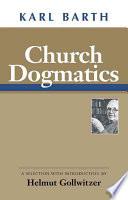Quotes from book
Church Dogmatics

Church Dogmatics is the four-volume theological summa and magnum opus of Swiss Protestant theologian Karl Barth, and was published in twelve part-volumes from 1932 to 1967. The fourth volume of the Church Dogmatics is unfinished, and only a fragment of the final part-volume was published, and the remaining lecture notes was published posthumously. Karl Barth's planned fifth volume was never written.

2:2 <!-- p. 317 -->
Paraphrased variant: Man can certainly flee from God... but he cannot escape him. He can certainly hate God and be hateful to God … but he cannot change into its opposite the eternal love of God which triumphs even in his hate.
Quoted in Simpson's Contemporary Quotations (1998) by James Beasley Simpson.
Church Dogmatics (1932–1968)
Context: Man can certainly keep on lying (and he does so); but he cannot make truth falsehood. He can certainly rebel (he does so); but he can accomplish nothing which abolishes the choice of God. He can certainly flee from God (he does so); but he cannot escape Him. He can certainly hate God and be hateful to God (he does and is so); but he cannot change into its opposite the eternal love of God which triumphs even in His hate. He can certainly give himself to isolation (he does so — he thinks, wills and behaves godlessly, and is godless); but even in his isolation he must demonstrate that which he wishes to controvert — the impossibility of playing the "individual" over against God. He may let go of God, but God does not let go of him.

2:2 <!-- p. 625 -->
Church Dogmatics (1932–1968)
Context: The saving of anyone is something which is not in the power of man, but only of God. No one can be saved — in virtue of what he can do. Everyone can be saved — in virtue of what God can do. The divine claim takes the form that it puts both the obedient and the disobedient together and compels them to realise this, to recognise their common status in face of the commanding God.

2:1 <!-- p. 661 -->
Church Dogmatics (1932–1968)
Context: We are now assuming that we have here the centre and goal of all God's works, and therefore the hidden beginning of them all. We are also assuming that the prominent place occupied by this divine work has something corresponding to it in the essence of God, that the Son forms the centre of the Trinity, and that the essence of the divine being has, so to speak, its locus … in His work, in the name and person of Jesus Christ.

4:4 <!-- p. 150 -->
Church Dogmatics (1932–1968)
Context: Since Jesus Christ is a servant, looking to Him cannot mean looking away from the world, from men, from life, or, as is often said, from oneself. It cannot mean looking away into some distance or height. To look to Him is to see Him at the very centre, to see Him and the history which, accomplished in Him, heals everything and all things, as the mystery, reality, origin and goal of the whole world, all men, all life. To look to Him is to cleave to Him as the One who bears away the sin of the world. It is to be bound and liberated, claimed, consoled, cheered and ruled by Him.

“He may let go of God, but God does not let go of him.”
2:2 <!-- p. 317 -->
Paraphrased variant: Man can certainly flee from God... but he cannot escape him. He can certainly hate God and be hateful to God … but he cannot change into its opposite the eternal love of God which triumphs even in his hate.
Quoted in Simpson's Contemporary Quotations (1998) by James Beasley Simpson.
Church Dogmatics (1932–1968)
Context: Man can certainly keep on lying (and he does so); but he cannot make truth falsehood. He can certainly rebel (he does so); but he can accomplish nothing which abolishes the choice of God. He can certainly flee from God (he does so); but he cannot escape Him. He can certainly hate God and be hateful to God (he does and is so); but he cannot change into its opposite the eternal love of God which triumphs even in His hate. He can certainly give himself to isolation (he does so — he thinks, wills and behaves godlessly, and is godless); but even in his isolation he must demonstrate that which he wishes to controvert — the impossibility of playing the "individual" over against God. He may let go of God, but God does not let go of him.